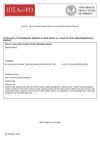 3 citations,
April 2022 in “Veterinary world/Veterinary World”
3 citations,
April 2022 in “Veterinary world/Veterinary World” The mesenchymal stem cell-conditioned medium gel improved burn healing and hair growth in rats better than other treatments.
April 2024 in “Cosmetics” Microneedling improves skin and hair conditions by enhancing treatment absorption and stimulating growth factors.
1 citations,
February 2024 in “Diversity” African plants can treat hair issues and may help with diabetes.
 34 citations,
July 1987 in “The Journal of dermatologic surgery and oncology”
34 citations,
July 1987 in “The Journal of dermatologic surgery and oncology” Improved dermabrasion techniques in 1987 led to better treatment results for skin issues like acne scars.
4 citations,
December 2022 in “Infection and Drug Resistance” Fire needle therapy is an effective and better alternative to surgery for early-stage neck carbuncles.
 119 citations,
July 2016 in “Annals of the New York Academy of Sciences”
119 citations,
July 2016 in “Annals of the New York Academy of Sciences” Vitamin D has potential benefits for cancer prevention, heart health, diabetes, obesity, muscle function, skin health, and immune function, but clinical results are mixed and more research is needed.
 3 citations,
July 2017 in “Elsevier eBooks”
3 citations,
July 2017 in “Elsevier eBooks” Skin reactions are a common reason for emergency visits due to drug allergies, with some severe cases needing intensive care.
 November 2021 in “Folia Microbiologica”
November 2021 in “Folia Microbiologica” Trichophyton bullosum has been found causing severe skin infections in donkeys in North Africa for the first time since 1933.
61 citations,
April 2023 in “Bioactive Materials” Microneedles are effective for painless drug delivery and promoting wound healing and tissue regeneration.
 1 citations,
May 2017 in “InTech eBooks”
1 citations,
May 2017 in “InTech eBooks” Some natural remedies may help with hair regrowth, but more research is needed to confirm their effectiveness and safety.
1 citations,
December 2022 in “Bioactive Materials” The microneedle patch with quercetin, zinc, and copper effectively promotes hair regrowth for androgenic alopecia.
 53 citations,
April 2021 in “Cell Host & Microbe”
53 citations,
April 2021 in “Cell Host & Microbe” Skin bacteria, specifically Staphylococcus aureus, help in wound healing and hair growth by using IL-1β signaling. Using antibiotics on skin wounds can slow down this natural healing process.
 46 citations,
January 2020 in “Research”
46 citations,
January 2020 in “Research” Microneedle technology has advanced for painless drug delivery and sensitive detection but faces a gap between experimental use and clinical needs.
 October 2023 in “Biomaterials”
October 2023 in “Biomaterials” Nanotechnology could improve hair regrowth but faces challenges like complexity and safety concerns.
 8 citations,
June 2022 in “International Journal of Molecular Sciences”
8 citations,
June 2022 in “International Journal of Molecular Sciences” Tiny particles called extracellular vesicles show promise for skin improvement and anti-aging in facial care but face challenges like low production and lack of research.
 6 citations,
July 2021 in “Microbial biotechnology”
6 citations,
July 2021 in “Microbial biotechnology” The combined treatment with engineered bacteria and yellow LED light improved wound healing in mice.
 January 2024 in “Journal of Ayurveda Campus”
January 2024 in “Journal of Ayurveda Campus” Psoralea corylifolia Linn. is a medicinal plant used for skin diseases and has various health benefits.
 January 2018 in “Modern approaches in drug designing”
January 2018 in “Modern approaches in drug designing” Kunzea oil may help stimulate hair growth.
 39 citations,
January 2019 in “Journal of Dermatological Treatment”
39 citations,
January 2019 in “Journal of Dermatological Treatment” Ketoconazole cream is effective for skin conditions like seborrheic dermatitis and may help with hair loss and other skin issues, with generally mild side effects.
 5 citations,
October 2022 in “Cosmetics”
5 citations,
October 2022 in “Cosmetics” Cell-based models help test if cosmetic ingredients really work for hair growth and skin health.
 6 citations,
June 2022 in “Dermatologic Therapy”
6 citations,
June 2022 in “Dermatologic Therapy” Honokiol from Magnolia plants may be beneficial for treating various skin conditions and promoting hair growth.
 2 citations,
October 2021 in “Egyptian Journal of Chemistry”
2 citations,
October 2021 in “Egyptian Journal of Chemistry” Iron nanoparticles made from pumpkin extract effectively treated burns and promoted healing in mice.
 59 citations,
January 2010 in “Pharmacognosy Reviews/Bioinformatics Trends/Pharmacognosy review”
59 citations,
January 2010 in “Pharmacognosy Reviews/Bioinformatics Trends/Pharmacognosy review” Semecarpus anacardium Linn. has many medicinal benefits.
 1 citations,
March 2023 in “Colloids and surfaces. B, Biointerfaces”
1 citations,
March 2023 in “Colloids and surfaces. B, Biointerfaces” A new wound dressing with p-Coumaric acid helps heal diabetic wounds faster by reducing inflammation and promoting skin repair.
14 citations,
July 2017 in “Pakistan Journal of Zoology” Fenugreek leaf extracts significantly promoted hair growth in mice with alopecia.
 22 citations,
October 2019 in “International Journal of Nanomedicine”
22 citations,
October 2019 in “International Journal of Nanomedicine” The nanoparticles improved hair growth and enlarged hair bulbs.
 April 2024 in “Frontiers in pharmacology”
April 2024 in “Frontiers in pharmacology” Cynoglossum amabile has medicinal potential but poses safety concerns due to liver toxicity.
 47 citations,
March 2017 in “Materials Science and Engineering: C”
47 citations,
March 2017 in “Materials Science and Engineering: C” Human amniotic membrane helps heal skin wounds faster and with less scarring.
 December 2023 in “Medicine and Materials”
December 2023 in “Medicine and Materials” Essential oils are increasingly used in cosmetics for their natural benefits but must be used carefully to avoid skin reactions.
 5 citations,
September 2023 in “Journal of ethnopharmacology”
5 citations,
September 2023 in “Journal of ethnopharmacology” Purslane has many health benefits and potential uses in medicine, food, and farming.
























